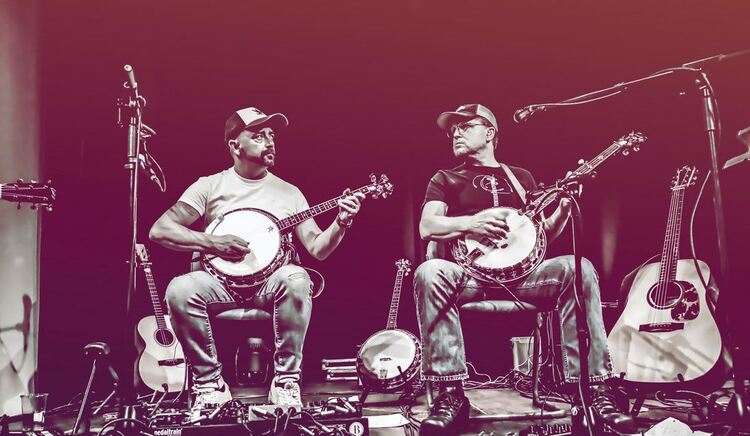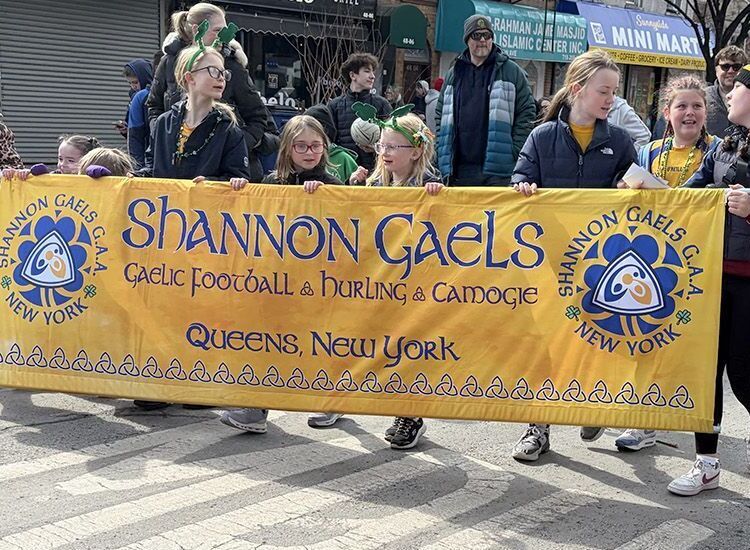Cherish the Ladies leading the way at the fleadh.
By Colleen Taylor
The Fleadh Cheoil na hÉireann 2019 concluded on Sunday, Aug. 18, with some beautiful weather over the weekend, and the outdoor crowds and musicians playing in the streets of Drogheda, Co. Louth, enlivened with the sun.
The eight-day festival completed the town’s very successful two-year stint as host. While walking around Drogheda’s hilly streets, I instantly felt the jubilant, infectious atmosphere—where Irish music’s permanence felt completely normal, rather than the special treat it usually is. Indeed, it would seem the town of Drogheda was built for the fleadh, with easy access from pub to pub and music that naturally spilled out into the streets. Reports say that Drogheda’s second run was one of the most successful fleadh festivals to date with over 700,000 attendees. Equally remarkable were this year’s headliners, including innovative music from Eleanor McEvoy and a concert by New York’s very own Cherish the Ladies.
The second full week of August 2019 was a special one for Irish culture, when the globe seemed to resound with Irish music, concentrated in two cities on either side of the Atlantic: Milwaukee and Drogheda. While many big-name traditional Irish bands and up and comers made their way to Wisconsin for the massive and renowned Milwaukee Irish Fest (Aug. 15-18), many American traditional musicians—both amateur and professional—flocked to Louth to meet the legends of traditional music.
The week in Drogheda kicked off with a performance by the Martin Hayes Quartet, the brainchild of two visionary traditional musicians, Martin Hayes and Dennis Cahill—who amplified traditional music sounds with the added textures of bass clarinet and viola. A couple days later, a band more traditionally Irish in instrumentation yet more Americanized and boisterous in personality, Cherish the Ladies, performed in the same Drogheda concert dome. As Joanie Madden always reminds us, Irish music can encompass both the serious task of upholding tradition and a serious amount of fun. Cherish the Ladies represent a source of pride for me as an American lover of Irish music and a feminist—they both established and maintain an imperative for keeping the music alive at home in the States and inspiring young women, many of whom participated in the fleadh competitions, to pursue an Irish music career.
A special event on the fleadh’s agenda this year was the annual “overseas concert,” which featured musicians from Comhaltas Ceoltóirií Éireann’s international branches in Japan, Brazil, Australia, and of course North America. Our own American representatives were the St. Louis Irish Arts and Mid-Atlantic Musicians from New York. But most remarkable of all, perhaps, were the 10 Japanese musicians featured from Comhaltas’s still young branch in Tokyo.
The week was not all about orthodox tunes and style, however. The concert lineup featured some pop-star allure with a show from Nathan Carter, the English-Irish country music star who is steadily gaining greater fame in Ireland and the UK with each passing year. Carter evinces the fleadh’s willingness to incorporate new ideas and popular trends into the task of tradition keeping, such as Carter’s unique brand of large-scale, big band Irish country music. The singer’s most recent live album, “Celtic Country” (2019), for example, evinces his heartthrob star quality and Irish heritage. The album includes songs like “Good Time Girls,” pop song “Shut Up and Dance” and “Wagon Wheel,” as well as Carter’s Ireland-inspired originals like “Temple Bar,” and country renditions of “Dublin in the Rare Auld Times.”
At the end of the fleadh week, fiddler Frankie Gavin took the stage with his new ensemble and of four fiddles, known as “the Provenance,” joined by singer-songwriter Karan Casey and her band. Both Casey and Gavin have become legends of their respective trades over the past two decades, both having recently embarked on new music projects—the Provenance for Gavin and a recent album release, “Hieroglyphs that Tell the Tale,” for Casey, praised by the Echo’s Daniel Neely.
The Drogheda fleadh contained a sense not only of tradition and legacy, but also of mystery and history. The festival’s agenda involved tours of the mystical and historically rich Boyne Valley. What’s more, the festival harkened back to music of centuries long past, particularly with Eleanor McEvoy’s sold out concert, where she showcased her new album, the Thomas Moore Project. In this new musical endeavor, McEvoy reimagines and reinterprets the poems and melodies of early 19th-century of composer and writer Thomas Moore—the most famous Irish musician of his day. Jane Austen fans, for instance, may be interested to learn that ladies in English Regency drawing rooms were often singing Moore’s Irish melodies. McEvoy has reached back into history’s distant past to re-insert those tunes into our cultural memory. That kind of creative preservation is the precise energy of an event like the fleadh—when history comes so vividly to life that it no longer feels like history at all. The marriage of Irish poetry and Irish musical reinvention is becoming something of a trend: like McEvoy, singer Christine Tobin has created an entire show around Yeats’s poetry, called “Sailing to Byzantium,” recently featured at the New York Irish Repertory Theatre.
All this, however, is but a small sampling of a vast array of talented musicians, both well-known and not, who performed at the fleadh this year in pubs, concerts, competition, and FleadhTV on TG4. Drogheda reminded me just how many phenomenal Irish traditional bands there are today—too many to count, too many, even, for me to review in the column, and certainly too many for the number of stages across the country. But thankfully in Drogheda, stages are not needed to accommodate talent—a sidewalk will do just fine. Among those performers I’ve already mentioned, were a number of other names familiar to trad and Irish folk lovers: Altan, John Doyle and Mick McAuley, Goitse, Cúig, Líadan, the new folk-electro fusion Thanks Brother (Roisin O and John Broe), Scottish songwriter Kris Drever, and the equally legendary Dónal Lunny. Even Kate Rusby made a quick appearance on Fleadh TV.
If you’re feeling like you missed out on the fleadh fun in Drogheda, don’t fret—a large sampling of the tunes and talent is available through FleadhTV on Facebook and YouTube. So even as the week of Irish music across the globe winds down, we can still relive the revelry on the virtual stage.









